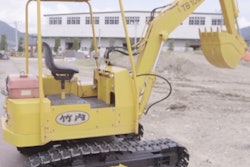
Stress in isolated events is normal and can be even beneficial to push through certain situations. While stress is often believed to be unnatural, it is actually prolonged periods of stress that you need to be concerned about. Constantly being in a fight or flight mentality can wear on your body, physically, mentally and emotionally.
According to the American Psychological Association, chronic stress can occur in response to everyday stressors that are ignored or poorly managed.
There are two types of stress: life-induced and self-induced. Life-induced stress is caused by real-life events that are initially out of a person’s control. Self-induced stress is a result of uncontrolled thinking or mismanagement of things in a person’s control.
Life-induced stress can often be controlled by being proactive or by having a plan to handle setbacks like equipment breaking down on the job or inclement weather. By performing preventative maintenance on your machines, you can lessen the frequency of malfunctions, and by scheduling in weather days, stormy conditions won’t throw your schedule off track.
Self-induced stress is far more likely to fly under the radar but can create the negative side effects of being in a high-pressure environment for too long.
Mentally you can struggle to focus, remember and engage while emotionally you will experience loneliness, depression, lack of confidence, irritability and mood swings.
Physically, chronic stress can exhibit itself as insomnia, muscle tension, high blood pressure, digestive issues, heart disease, weight problems and/or a weakened immune system.
When you are trying to lessen stress in your life you need to stop and recognize what the main stressors are before you can do something about them. Here are the five main self-induced stressors.
Poor planning
This could be as individual as you constantly arriving to work late or as broad as you losing customers because you failed to create a sound work schedule to get their project completed by the agreed deadline. Some people aren’t the best at planning in general, but this isn’t an excuse. If tardiness is an issue, make the effort to leave or be ready well before the actual time.
If you struggle with planning on the business side of things, seek to hire an employee who can manage that portion of the business or reach out to a landscaping consultant company for advice on how to schedule jobs.
Disorganization
Clutter can be one of the most unconscious stressors in a person’s life. You may insist there is a method to the madness, but the visual chaos can make you feel overwhelmed. Having a proper place for everything and established systems will make sure tools don’t go amiss and invoices are sent out in a timely manner.
If you have a considerable backlog of paperwork you want to transfer to digital files, don’t kill yourself trying to get done all in one day or you will feel even more burnt out. Handle the task a little bit at the time, and then have a method in place to prevent the clutter from collecting again.
Worry
The most common self-induced stressor is worry and this is when you let your mind go wild with the “what ifs.” There are a million possibilities that could happen but most of the time your what ifs are so unlikely it’s about as foolish as preparing for the zombie apocalypse.
Many are often credited with saying, “Worry is like a rocking chair, it gives you something to do, but gets you nowhere.” The saying is true because the emotion solves nothing. If there are concerns that are truly looming over you whether it be your revenue stream or retaining loyal employees, do something about it. There are matters that are out of your control, but take charge of what you can change.
Guilt
Similar to worry, guilt cannot not change the past, just like how worry cannot change the future. Everyone makes mistakes and it is important to own yours and make them right if you can, but you cannot continually torture yourself about a poor business choice you made 20 years ago or having to let go of that employee two weeks ago.
If you have done your best to remedy an oversight, learn from the mistake but don’t let it haunt you. Forgive yourself and remember to extend mercy to others when the tables are turned.
Negative thoughts
It sounds trite but truly having a positive attitude can help improve your health and your happiness. Negative thoughts can tear you down, paralyze you and result an increased risk for heart disease according to some studies. Overthinking or constantly criticizing yourself and/or your work will demoralize you and make it far harder to lead your company.
There’s nothing wrong with having negative thoughts from time to time, but is important not to believe them as true. When your inner self critic begins to say you’ve accomplished nothing, shut that thought down with a positive thought to replace it. You must choose to be optimistic and it’s also a good idea to avoid pessimists.









